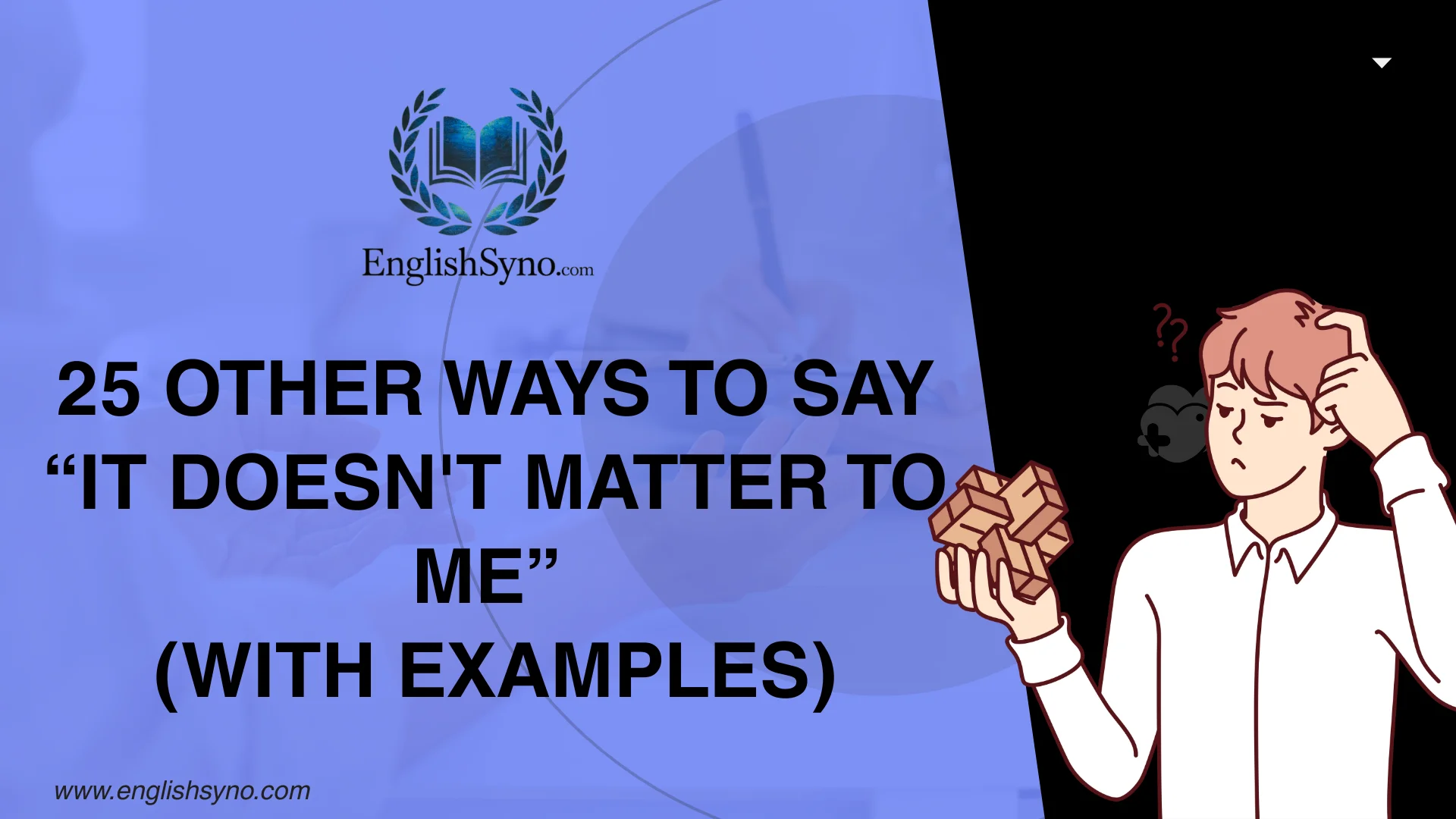Sometimes in life, It Doesn’t Matter to Me, and realizing a lack of importance in things with little or no significance can ease your concern. This indifference expresses a preference when multiple choices or options are offered, helping you make honest decisions without causing unnecessary argument or stress.
Even small daily decisions, like choosing blue or white paint for your house, or which movies to see, even if they sound terrible, reflect the same principle. The literal phrase “It Don’t Matter to Me,” from the 1970 song by Bread, a band with a top 10 hit, serves as a useful reference to understand context where what seems important to others may be irrelevant to you.
What Does “It Doesn’t Matter to Me” Mean?
The phrase “It Doesn’t Matter to Me” indicates a lack of preference or importance toward a particular choice, decision, or outcome. It conveys indifference, showing that you are flexible or open to whatever others decide, without creating conflict or pressure.
When to Use “It Doesn’t Matter to Me”
Use this phrase when you want to:
- Express indifference politely
- Avoid arguments over minor decisions
- Show flexibility in plans or opinions
Is It Professional/Polite to Say “It Doesn’t Matter to Me”?
Yes, when used correctly. In professional settings, it communicates flexibility and openness. Pair it with context to ensure clarity.
Pros and Cons
Pros:
- Shows flexibility
- Reduces conflict
- Demonstrates politeness
Cons:
- Can appear indecisive
- May frustrate others needing guidance
- Sometimes perceived as disinterest
I’m Fine With Anything
Definition & Meaning: Indicates openness to any option.
Detailed Explanation: Shows willingness to adapt without expressing a strong preference.
Example: “Do you want coffee or tea?” “I’m fine with anything.”
Best Use: Casual conversations with friends or family.
Worst Use: Decisions requiring leadership input.
Tone: Neutral, relaxed, friendly.
It’s All the Same to Me
Definition & Meaning: Suggests no difference in preference between options.
Detailed Explanation: Communicates equality between choices, indicating indifference.
Example: “Should we watch a comedy or drama?” “It’s all the same to me.”
Best Use: Informal settings, team discussions.
Worst Use: When your input is expected to sway a choice.
Tone: Neutral, casual.
Whatever You Prefer
Definition & Meaning: Lets the other person decide freely.
Detailed Explanation: Shows politeness and deference to the other party’s preference.
Example: “Where should we eat tonight?” “Whatever you prefer.”
Best Use: Polite, friendly interactions.
Worst Use: In formal decisions requiring consensus.
Tone: Polite, accommodating.
I Have No Preference
Definition & Meaning: Clearly communicates lack of preference.
Detailed Explanation: Useful in formal or neutral situations to express flexibility.
Example: “Which design should we pick?” “I have no preference.”
Best Use: Professional or neutral settings.
Worst Use: When a definitive answer is needed.
Tone: Neutral, professional.
It Doesn’t Make a Difference to Me
Definition & Meaning: Indicates the outcome is irrelevant to you.
Detailed Explanation: Helps avoid unnecessary debate by expressing indifference.
Example: “Should we start at 9 or 10?” “It doesn’t make a difference to me.”
Best Use: Casual or professional settings.
Worst Use: When your choice impacts others significantly.
Tone: Neutral, considerate.
It’s Up to You
Definition & Meaning: Lets the other person make the decision, showing flexibility.
Detailed Explanation: This phrase communicates that you are willing to defer and that the choice is irrelevant to you.
Example: “Should we meet at 2 or 3?” “It’s up to you.”
Best Use: Casual conversations or meetings with friends.
Worst Use: Critical decisions where your input is necessary.
Tone: Polite, accommodating, neutral.
I’m Easy Either Way
Definition & Meaning: Indicates flexibility and no preference between options.
Detailed Explanation: Often used to convey casual indifference while remaining agreeable.
Example: “Do you want sushi or pizza?” “I’m easy either way.”
Best Use: Informal settings and friendly interactions.
Worst Use: Situations needing precise decision-making.
Tone: Relaxed, friendly.
Do As You Wish
Definition & Meaning: Gives full autonomy to the other person, showing polite detachment.
Detailed Explanation: This phrase communicates indifference while maintaining a respectful tone.
Example: “Should we start with the report or the presentation?” “Do as you wish.”
Best Use: Professional or casual scenarios where flexibility is appreciated.
Worst Use: When indecision may cause confusion.
Tone: Polite, neutral.
I’ll Go With Your Choice
Definition & Meaning: Demonstrates willingness to follow someone else’s decision.
Detailed Explanation: Indicates trust in the other person’s preference and lack of strong opinion.
Example: “Which movie should we watch?” “I’ll go with your choice.”
Best Use: Casual group decisions or social situations.
Worst Use: When your input is crucial for a balanced decision.
Tone: Friendly, flexible.
I Don’t Mind
Definition & Meaning: Shows indifference without seeming dismissive.
Detailed Explanation: Useful in polite conversation to communicate flexibility.
Example: “Do you want to walk or drive?” “I don’t mind.”
Best Use: Everyday discussions, casual planning.
Worst Use: When a clear answer is needed.
Tone: Neutral, calm.
Suit Yourself
Definition & Meaning: Indicates the other person can decide, though slightly informal or playful.
Detailed Explanation: Works best in relaxed conversations but can carry a subtle tone of detachment.
Example: “Do you want tea or coffee?” “Suit yourself.”
Best Use: Informal, friendly settings.
Worst Use: Professional meetings or serious contexts.
Tone: Casual, playful.
Feel Free to Decide
Definition & Meaning: Encourages the other person to make the decision freely.
Detailed Explanation: Shows respect for the other’s choice while indicating your indifference.
Example: “Where should we eat tonight?” “Feel free to decide.”
Best Use: Polite social interactions.
Worst Use: When you must provide a specific preference.
Tone: Respectful, neutral.
I’m Open to Anything
Definition & Meaning: Communicates flexibility and willingness to accept any option.
Detailed Explanation: Shows adaptability without expressing a strong preference.
Example: “Do you want to hike or go to the beach?” “I’m open to anything.”
Best Use: Social gatherings or casual planning.
Worst Use: Situations needing decisive input.
Tone: Friendly, open-minded.
Your Call
Definition & Meaning: Puts the decision entirely in the other person’s hands.
Detailed Explanation: Shows trust and lack of concern about the outcome.
Example: “Which route should we take?” “Your call.”
Best Use: Friends, colleagues in informal settings.
Worst Use: Critical tasks requiring shared decision-making.
Tone: Casual, flexible.
Take Your Pick
Definition & Meaning: Invites the other person to choose freely, highlighting your indifference.
Detailed Explanation: Often used when multiple options are available.
Example: “Which dessert do you want?” “Take your pick.”
Best Use: Informal conversations, group settings.
Worst Use: Professional decisions needing clarity.
Tone: Friendly, relaxed.
Whatever Works for You
Definition & Meaning: Shows consideration for the other person’s convenience.
Detailed Explanation: Indicates flexibility while maintaining a polite tone.
Example: “Do you want to meet at 4 or 5?” “Whatever works for you.”
Best Use: Casual planning, accommodating situations.
Worst Use: Formal meetings requiring fixed schedules.
Tone: Polite, flexible.
It’s No Big Deal
Definition & Meaning: Downplays the importance of the choice or situation.
Detailed Explanation: Suggests the outcome is irrelevant to you.
Example: “Do you want me to sit here or there?” “It’s no big deal.”
Best Use: Casual or friendly conversations.
Worst Use: Serious decisions or high-stakes matters.
Tone: Casual, relaxed.
I’ll Leave It to You
Definition & Meaning: Transfers the decision to the other person.
Detailed Explanation: Demonstrates trust and indifference regarding the outcome.
Example: “Which route should we take?” “I’ll leave it to you.”
Best Use: Teamwork or casual decisions.
Worst Use: When your opinion is needed.
Tone: Polite, accommodating.
Up to You
Definition & Meaning: Very brief, indicates decision is theirs.
Detailed Explanation: Expresses flexibility in a concise, informal manner.
Example: “Do you want to start now or later?” “Up to you.”
Best Use: Casual discussions or informal messages.
Worst Use: Situations requiring explicit answers.
Tone: Neutral, casual.
I’m Good Either Way
Definition & Meaning: Indicates no strong preference, showing comfort with either choice.
Detailed Explanation: Polite and casual, conveys ease with outcomes.
Example: “Do you want to drive or take the bus?” “I’m good either way.”
Best Use: Friendly, informal contexts.
Worst Use: When your decision impacts others significantly.
Tone: Relaxed, accommodating.
No Preference
Definition & Meaning: Short, clear, professional expression of indifference.
Detailed Explanation: Effective in formal or written communication.
Example: “Which proposal do you approve?” “No preference.”
Best Use: Professional emails, surveys, or meetings.
Worst Use: Situations needing detailed guidance.
Tone: Neutral, professional.
Either Way is Fine
Definition & Meaning: Communicates acceptance of any option.
Detailed Explanation: Shows flexibility while being polite and friendly.
Example: “Should we meet in the morning or afternoon?” “Either way is fine.”
Best Use: Casual planning or group decisions.
Worst Use: When clarity or commitment is essential.
Tone: Friendly, accommodating.
Doesn’t Make a Difference
Definition & Meaning: Outcome is irrelevant to you.
Detailed Explanation: Helps avoid arguments over minor choices.
Example: “Do you want red or green chairs?” “Doesn’t make a difference.”
Best Use: Informal or neutral settings.
Worst Use: When input is required for critical matters.
Tone: Neutral, calm.
As You Like
Definition & Meaning: Defers to the other person’s preference.
Detailed Explanation: Polite and accommodating, conveys flexibility.
Example: “Do you want tea or coffee?” “As you like.”
Best Use: Friendly, polite interactions.
Worst Use: When a decisive choice is needed.
Tone: Polite, neutral.
I’ll Let You Decide
Definition & Meaning: Transfers decision-making authority to someone else.
Detailed Explanation: Demonstrates trust and lack of strong opinion.
Example: “Where should we go for lunch?” “I’ll let you decide.”
Best Use: Casual group decisions or friendly situations.
Worst Use: Critical decisions needing input from all parties.
Tone: Friendly, polite.
Final Thoughts
Finding the right way to say “It Doesn’t Matter to Me” can transform everyday conversations into moments of empathy, flexibility, and respect. Language is powerful, and choosing alternatives that communicate indifferent thought allows you to maintain harmony while showing politeness and understanding. Whether in casual chats with friends, professional discussions, or sensitive negotiations, expressing that a choice or outcome holds little significance to you can prevent misunderstandings and reduce unnecessary conflict. Using phrases like “I’m fine with anything”, “Whatever you prefer”, or “It’s all the same to me” signals that you are considerate and adaptable, while remaining clear and approachable.
It’s important to balance indifference with engagement. While conveying flexibility, ensure your tone communicates that you are not dismissive but genuinely open to others’ preferences. This approach strengthens relationships and demonstrates emotional intelligence. Additionally, being mindful of context-formal or informal-enhances the effectiveness of your words. These 25 alternatives provide a wide range of options, from casual and playful expressions to professional and polite variations.
Ultimately, mastering these expressions fosters better communication, promotes collaboration, and shows thoughtfulness in interactions. By carefully selecting words that reflect empathy and clarity, you make conversations more meaningful and enjoyable for everyone involved, turning simple choices into opportunities for connection and mutual respect.
FAQs
What does “It Doesn’t Matter to Me” mean?
It indicates a lack of preference or importance toward a choice or outcome. It shows flexibility and politeness in casual and professional situations.
Is it polite to say “It Doesn’t Matter to Me”?
Yes, especially when paired with context or warmth. It communicates flexibility and avoids conflict without sounding dismissive.
Can I use it in professional settings?
Absolutely. Use it to show willingness to adapt or defer decisions politely in meetings, emails, or teamwork.
How is it different from “I don’t care”?
“I don’t care” may sound dismissive. “It doesn’t matter to me” is neutral, polite, and empathetic.
When should I avoid it?
Avoid when a decisive answer is needed or your opinion directly impacts outcomes.
What are casual alternatives?
Phrases like “I’m fine with anything,” “Whatever you prefer,” or “I’m easy either way” work well in friendly contexts.
What are professional alternatives?
Use “I have no preference,” “Either way is fine,” or “It doesn’t make a difference” in formal situations.
Can it prevent conflicts?
Yes. Expressing flexibility reduces arguments over minor decisions and shows consideration for others.
Does tone matter?
Absolutely. Tone ensures your indifference feels polite and adaptable rather than dismissive or careless.
Can I use it in group decisions?
Yes. It demonstrates flexibility while allowing others to take the lead.
Is it the same as being indecisive?
Not necessarily. It reflects openness and trust, not a lack of judgment.
How to use it in writing?
Include context to clarify your flexibility and maintain politeness in emails or texts.
Can humor be used with it?
Yes. Phrases like “Suit yourself” or “Do as you wish” can add a playful tone among friends.
Does culture affect its use?
Yes. In some cultures, expressing flexibility politely is valued, while in others, decisiveness is preferred.
How does it build relationships?
It shows empathy, consideration, and willingness to accommodate, enhancing trust and rapport with others.

Muhammad Altaf is an English language specialist and professional content strategist with over 10 years of experience writing and teaching practical English usage, professional communication, and tone awareness. His work focuses on helping readers express ideas clearly, naturally, and confidently in real-world contexts.


